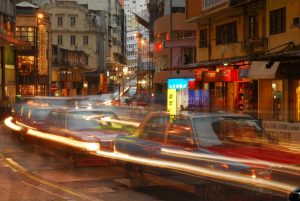In Hong Kong, confirmed cases of COVID-19 have been soaring. As of April 3, 845 local residents have tested positive and four passed away. Amid the public health crisis, marginalized communities, including the 13,000 refugees in the city, are among the most vulnerable.
Local refugees receive limited welfare from the government. These payments include a monthly housing allowance of HK$1,500 (US$193) paid directly to the landlord, a HK$1,200 (US$155) food allowance stored in a pre-paid supermarket card, HK$300 (US$79) for utilities, and some petty cash for transportation to appointments with nongovernmental organizations (NGOs) and relevant government authorities.
Notably, none of this would help refugees secure products to protect their health during the pandemic. Due to high demand, sanitation products, including medical face masks and hand sanitizers, have seen their prices hyper-inflated. A pack of 50 disposable masks sells for up to HK$300 (US$39), while the price of advanced N95 masks hits as high as HK$1,800 (US$232) a box. Refugees mostly cannot afford to purchase these masks. Even if they have sufficient financial resources, their food cards can only be used in designated supermarkets, which may not necessarily have masks in stock.
Additionally, despite the regular dissemination of public health information within the city, refugees encounter language barriers to understanding COVID-19 related information. Most of the government’s public announcements are made in Chinese, while minority languages, such as Hindi and Urdu, are absent on the government’s factsheets.
Worse still, schools have moved to online teaching due to their closures. Refugee children whose families face financial constraints do not have access to computers, essential for distance learning. Even if some refugee households have computers, children, alongside their parents, may not have the experience with and knowledge of technology needed to utilize those online learning platforms.
A range of parties, including community groups, NGOs, and the government, should therefore work collectively to enhance the safety of, and realize both the right to information and right to education for, refugee households.
On March 29, an international church named The Vine was collecting donated face masks for the children of local forced migrants. Some 150 face masks were delivered to these children aged 11 or younger. Local NGOs such as Christian Action and Hong Kong Unison should follow The Vine and urge Hong Kongers to donate face masks and hand sanitizers for the marginalized forced migrant cohorts who otherwise cannot access to sanitation products.
From this January, a handful of manufacturers and start-ups have begun mass production of face masks. These organisations include SPT Mask, Mask Factory, and Hong Kong Masks. Face masks sold by these organisations cost HK$150 (US$19) per 50 pieces or less, which are cheaper than those sold in supermarkets and pharmacies. The government should invest in local production of face masks by subsidizing, or delivering grants to, these local manufactures and start-ups, allowing them to expand the scale of their mask production. The government should also lower the profit taxes in this fiscal year for manufacturers and start-ups who help to supply affordable masks.
The government should collaborate with local NGOs, especially Christian Action and Hong Kong Unison, who have long been issuing publications about minority in English, Chinese, and minority languages, to design public health factsheets and videos in a number of the most used minority languages. Moreover, the government should subsidize these NGOs to hire more interpreters who are capable of speaking languages alternative to English and Chinese. These interpreters can help disseminate public health information and updates to refugees on a regular basis.
Since public libraries have been closed due to the pandemic, many laptops have not been in use. The government should lend refugee children these technological resources until schools and libraries reopen. Schools should constantly send updates of online teaching and assessment schedules and instructions to all students by post and email. These suggested policies can help ensure that refugee children and/or their parents understand how to gain access to online learning platforms and resources.
Jason Hung is a freelance columnist at South China Morning Post.

































